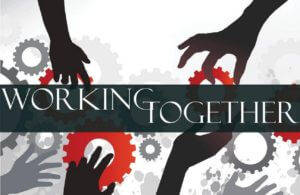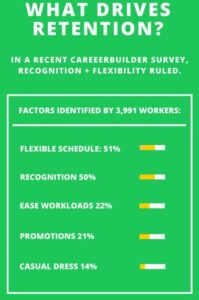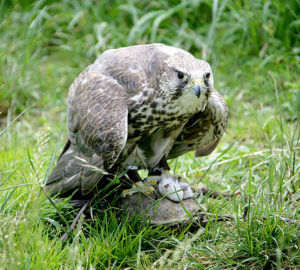If it does, it’s a great place to work.
Employee recognition company Bonusly recently published a great article entitled 10 Dead Simple Ways to Improve Your Company Culture.
I liked the article. A lot. But that’s probably because I noticed that talent-aligned employees working in teams of united talents can make a serious impact on all 10 ways.
Two key phrases in this post
Talent-aligned: When people’s natural talents are aligned with their job.
Team of united talents: When the whole team is talent-aligned.
Anyway, I decided to lay them out one by one and let you be the judge. Here they are.
- Embrace transparency

Bonusly says that transparency is about ‘Giving employees a voice. And most of all, it’s about trust.’ Then they recommend a single solution:
Implement modern communication and collaboration tools.
I heartily agree. Talent alignment opens up communication within and between teams in the most meaningful manner. It allows individuals to ‘see’ the talents of others – even new joiners – instantly. Then they are able to collaborate on projects as if they were old friends. Team members can talk about their own and each other’s talents in a new light and turn their departments from HR org charts into real teams of united talents.
When you can see everyone’s talent like a picture on a page, the enterprise is transparent.
- Recognize and reward valuable contributions

Bonusly says that companies that have a recognition-rich culture also tend to have dramatically lower turnover rates.
They emphasize that recognition should come from co-workers as well as bosses. And it should not just come formulaically in kick-off events, but regularly and spontaneously.
In a talent-aligned culture, people are known and valued for their talents. They receive recognition from co-workers every minute of the day, naturally and in a satisfying drip-feed. And their reward is the one that is sought after worldwide in every culture: honest appreciation for their contribution.
Talent-aligned employees are generous with their compliments.
- Cultivate strong co-worker relationships

This is easy to do in a talent-aligned culture. In other environments it’s as hard as penetrating granite.
When you know someone for their talents – and they know you for yours – you understand each other better, instantly. You know each other’s worth. You know all the things they can do, all the areas they excel. Remember that talent is deep, it comes from within. So when you know someone’s talent it’s like knowing them as they are. Then you have the foundation for a strong relationship.
It’s impossible not to like people when you know what they’re good at.
- Embrace and inspire employee autonomy

In a talent-aligned culture, employee autonomy is the natural way of things. People are doing the work they were made for. And everyone around them can see it and lets them get on with it. What’s more beautiful than that?
People work better – alone or with others – when they’re talent-aligned.
- Practice flexibility

In a recent CareerBuilder survey, of nearly four thousand workers, flexibility proved to be one of the biggest drivers of retention. In fact it was right up the top along with Recognition.
Many managers worry about allowing employees to work flexible hours or to work-from-home. Who’s going to monitor them?
But workers in a talent-aligned, united team don’t need to be micro-managed. They’re already doing the work they love. So it’s safe to let them organize how they get their work done. Anyway, they come to work because they want to: work is the place where they receive constant validation and support. Maybe it’s the only place they get these. It’s the place where their previously-suffocated talents are allowed to open and breathe.
Try keeping them away.
- Communicate purpose and passion

Do your employees see purpose in their work? Are they passionate about what they do?
‘Many myths about work say that the only way you can experience purpose is to find work in a certain profession, like healthcare education or sustainability,’ says Arthur Woods of Imperative.
‘But in reality, there are no purpose professions. We all have an intrinsic need that has less to do with the content or category of your work and much more to do with who you are, how you see work, and how much fulfilment you experience.’
He continues ‘Purpose is derived from your relationships, your sense of impact, and your sense of personal growth’.
Sounds great. But how do you build relationships at work with people you don’t understand or respect? How do you make an impact when you are bored rigid? And how do you grow when you don’t like the space you’re supposed to grow into?
In a team of united talents, employees are closely matched with work that suits their talents and with co-workers whose talents they can read. Which means they’re never bored and they have great working relationships with colleagues. This means their purpose is empowered, not frustrated.
Outed talents fuel purpose.
- Promote a team atmosphere

What can be more about teams than talent-alignment and united talents? Talent-alignment brings purpose, harmony and down in your bones satisfaction not only to teams but to departments and organizations. It makes staff members more engaged (happier) as well as more productive. That’s because the teams they work in are real teams, teams of united talents, not just names on an org chart or people who share the same twelfth floor office space.
Talent-alignment gives teams and enterprises an atmosphere worth breathing.
- Give and solicit regular feedback

There are many great feedback guides including this one from OfficeVibe
But here’s the boiled-down essence: feedback works best when it comes at all hours (not just once a year) and from all directions (not just the boss).
In a talent-aligned culture, feedback is a constant flow of informal upticks that fuel employees’ need for validation. These upticks are not atomic prizegivings and reward holidays in Maui. They are more powerful than that. They are the regular murmurings of approval and thanks that flow in both directions (giving as well as receiving) when people are doing the work that their talents were crying out for and when they’re blending with colleagues like desert colors at dawn.
- Stay true to your core values

Real core values are much more than a list of bullet points on a company’s ‘about us’ page.
In a recent Huffington Post article Lolly Daskal wrote “Your values determine what is important and meaningful to you. They align with your purpose, and speak loudly and passionately to others — and to yourself — about who you are and what you’re called to do in this world.” I couldn’t write it better.
Everyone has core values. They sit deep within us and we cherish them like our children. But we need to know that our employer shares them, or even has better ones.
An enterprise’s core values must include bringing out the best in their staff. That means allowing their natural talents to shine and building teams of united talents where those talents can blossom and deliver purpose.
Natural talents are at our core, they come from within. When you give an employee a job that matches their talents, you invariably help them to stay true to their values, and yours. That makes for a peaceful work environment and a great office culture.
Tell your staff that talent-alignment is one of your core values.
- Give culture building the effort it deserves

Building a company culture takes a conscious commitment.
Some people think it also takes a lot of time. But that’s not necessarily true. They only say that because in the past it has taken a lot of time.
In reality the steps to a great work culture in your organization can be achieved remarkably quickly and the catalyst for achieving it is something completely natural. Natural strengths and talents. When you unearth the natural strengths and talents in your employees and align them with their job roles you have taken the most important step towards a world class culture.
And when you do that you not only benefit the enterprise you also do a remarkable service for the individual.
Talent-alignment >> teams of united talents >> great culture.
Thanks to George Dickson of Bonusly for original research.


